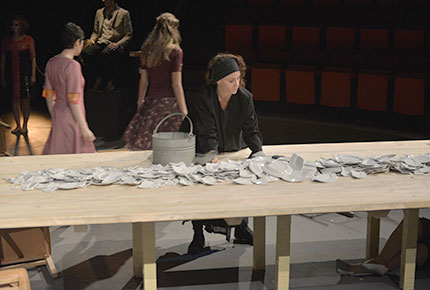With Lina Abyad, domestic violence takes center stage
LAU’s associate professor of Communication Arts uses the spring major production to voice her distress on domestic violence.
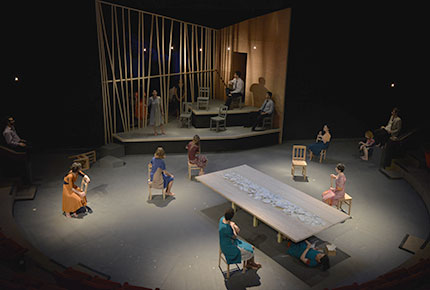
Throughout their work, there were tears, anger, bafflement at this inflicted violence and this learned helplessness, but they also know there is hope.
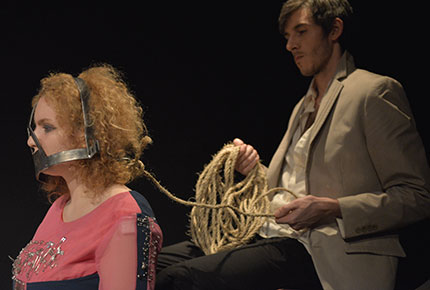
The actors found it difficult to relate to the roles they were thrust into, and had to struggle to understand their characters.
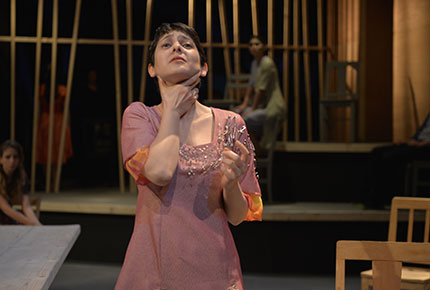
Abyad hopes that it will be the words of these women that break the circle of silence created by these violent men, the institution of marriage, the fear of their name being dragged in the mud, the obsolete traditions, the backward civil code, and the patriarchal system.
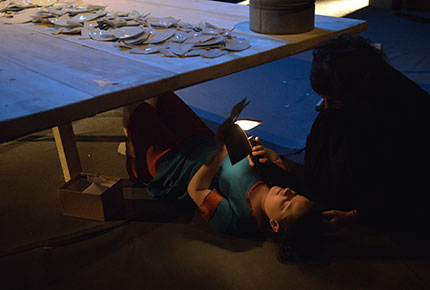
A particularly poignant scene ensures that the sound of broken china will never again sound the same to those who attend the play.
Art is the language artists resort to because it is the most powerful way to express their opinions. The narrative LAU’s Asssociate Professor of Communication Arts Lina Abyad wove together for the upcoming spring major theater production “Hayda Mesh Film Masri” (this is not an Egyptian movie), comes from an issue that deeply concerns her: that of domestic violence. When looking into the stories of such abuse what puzzled her most was the paradox of how love and abuse were intertwined.
“Your husband is supposed to be with you against the world, not against you,” Abyad explains, adding, “I couldn’t understand what made these men behave so foully toward the person they love.”
Having researched such relationships thoroughly, Abyad found out that the behavior of such abusive men follows a clear pattern. The similarities in the stories and interviews she heard from abused women around the world – from Lebanon, Ukraine, France, England and Pakistan among others – were uncanny.
To avoid suspicion, the men first isolate the women from their close community. All the while they abuse them emotionally, meddling with their self-esteem and self-confidence before eventually escalating to physical violence. After physically abusing his partner, the man feels guilty and tries to compensate by giving his partner love and care. The couple goes into a so-called “honeymoon” phase. This stage doesn’t last long. Should the woman attempt to find a way out of the relationship, the man threatens to hurt her or himself, making it impossible for her to flee. The pattern is thus established.
It is this pattern that propels the play, with female actors recounting, step-by-step, interacting and overlapping with each other, the common story of a woman who fell victim to domestic abuse.
Slipping into abusive and complex characters’ shoes was a difficult job for the actors. “At first I tried portraying him as a relatable person but I just couldn’t go through with it,” says Rami Saidi, an LAU theater graduate. Saidi’s role involves dragging his ‘wife’ around the stage with a rope attached to a brank. “His thoughts and ways of thinking were alien and disturbing to me” expands Saidi on the difficulties of identifying with the character he is playing.
“The first few weeks of rehearsals were spent crying, for the most part,” says Abyad. In fact, the director invited several of the abused women to attend rehearsals and watch their testimonies re-enacted, which consequently built a stronger connection between the cast, crew and the women they are representing.
“At first we all showed a lot of anger,” says Soha Choucair, an LAU Radio, TV and Film graduate, “Looking from the outside in at abusive relationships, the most common expression is rage and anger. My character, Salwa, reacted only with silence”.
In a recurrent poignant scene, a lady dressed in an oversized black dress goes on stage holding a bucket of broken porcelain and empties the contents on what seems to be a large dining table. A broken plate will never sound the same again, to those who attend the play.
More
Latest Stories
- Into the Psychology of Justice
- Alumnus Zak Kassas on Navigation, Spoofing and the Future of GPS
- Hearing Between the Lines
- LAU Hematology Conference 2025: Advancing Science Through Interdisciplinary Exchange
- Dr. Chaouki T. Abdallah Invested as LAU’s 10th President
- LAU Guides Its Students Through the Code of Conduct
- Innovative Procedure at LAU Medical Center–Rizk Hospital Signals Hope for a Patient With a Congenital Disease
- LAU’s Inaugural PodChat Session Addresses AI Detection in the Classroom


